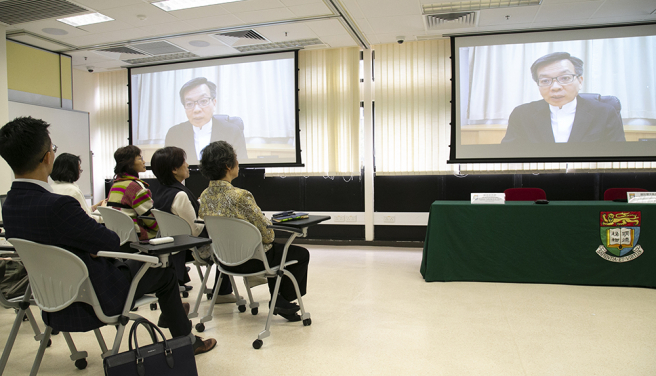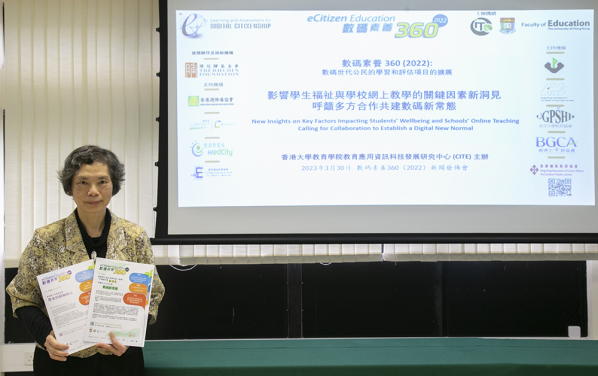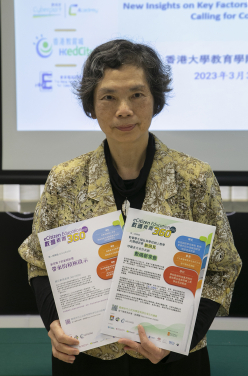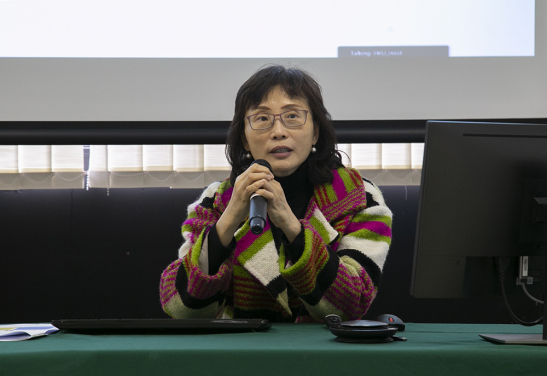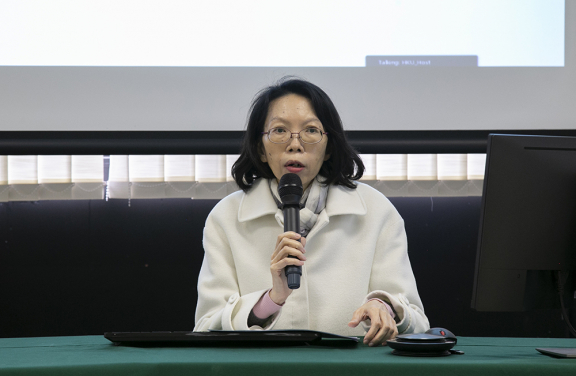Media
HKU e360 (2022) study finds new insights on key factors impacting students’ wellbeing and schools’ online teaching and calls for collaboration to establish a Digital New Normal
30 Mar 2023
A team of researchers led by Principal Investigator, Dr Cheng Yong Tan, and Co-Investigators, Professor Nancy Law and Professor Catherine K.K. Chan, from the Faculty of Education, The University of Hong Kong (HKU) released the last batch of findings of the eCitizen Education 360 (2022) study this afternoon (March 30). The D. H. Chen Foundation is the Growth Partner and Funder for this Project. The latest released results elucidate the key facilitating effects (self-regulated learning strategies, digital literacy, and cognitive emotional regulation strategies) on students’ wellbeing, complementary effects of different aspects of parenting on students’ wellbeing, and schools’ digital technology usage and positive climate on teachers’ online teaching self-efficacy.
Key research findings
1. Different student factors affecting students’ wellbeing (mental health) and online learning self-efficacy: Positive and negative cognitive emotional regulation strategies, self-regulated learning strategies, and digital literacy
On wellbeing (mental health)
- Students’ positive cognitive emotional regulation strategies (i.e., refocus on planning and positive reappraisal), self-regulated learning strategies (i.e., help-seeking, self-evaluation, and time management), and digital literacy (comprising information and data literacy, communication and collaboration, digital content creation, safety, and problem-solving) were common factors contributing to both primary and secondary students’ wellbeing (mental health).
- Both primary and secondary students who used more negative cognitive emotional regulation strategies (i.e., catastrophising and blaming others) or who had more cyberbullying experiences (e.g., perpetration, victimisation, being a bystander) were more likely to have had lower levels of wellbeing.
On online learning self-efficacy
- Students’ positive cognitive emotional regulation strategies and self-regulated learning strategies were common factors contributing to both primary and secondary students’ online learning self-efficacy. More importantly, students’ self-regulated learning strategies were an important predictor for their online learning self-efficacy.
- More usage of digital media for socialisation and entertainment, negative cognitive emotional regulation strategies, and more cyberbullying experiences had negative impacts on both primary and secondary students’ online learning self-efficacy.
- For primary students, those with higher levels of digital literacy were more likely to be more self-efficacious in terms of online learning. But such connection was not significant for secondary students.
2. Protective role of digital literacy on students’ wellbeing and cyberbullying
- Higher levels of digital literacy were associated with better wellbeing of both primary and secondary students.
- While experiencing cyberbullying had negative impacts on students’ wellbeing, digital literacy could reduce the probability of students experiencing cyberbullying (perpetration and victimisation) and thus protecting both primary and secondary students’ wellbeing.
- For secondary students, the association between digital literacy and cyberbullying bystander experiences could be due to their increasing usage of the internet and awareness of cyberbullying.
3. Students’ socioeconomic status (SES) affected students’ digital literacy, their use of digital media for socialisation and entertainment, their adoption of self-regulated learning strategies, cognitive emotional regulation strategies, and the extent of cyberbullying experiences that they might have.
- Primary and secondary students’ SES was a strong predictor of their’ digital literacy, positive cognitive emotional regulation strategies, and self-regulated learning strategies.
- Secondary students with higher SES were more likely to have more online socialisation and entertainment activities.
- Primary students with higher SES were more likely to have fewer cyberbullying experiences.
4. Of the different parenting practices, good parent-child relationship was the strongest predictor of students’ wellbeing. Digital parenting, parental home-based involvement, and parental school-based involvement had relatively weaker impact on students’ outcomes.
- All four different aspects of parenting, including parent-child relationship, digital parenting (i.e., parents’ understanding of good digital practices, such as how to use online resources productively and minimising risks, parents as role models and setting rules for media use in the family), parental home- and school-based involvement, contributed to students’ intermediate outcomes, especially on cognitive emotional regulation strategies and self-regulated learning strategies.
- Different aspects of parenting were inextricably related to one another, and having good parent-child relationships was the strongest predictor for students’ learning and wellbeing.
- Digital parenting, parental home- and school-based involvement had little impact on students’ learning and wellbeing.
- SES positively related to parent-child relationship, digital parenting, and parental home-based involvement.
5. Schools’ digital technology usage and positive climate are keys to develop teachers’ online teaching self-efficacy
Two pathways contributed to teachers’ online teaching self-efficacy (i.e., teachers’ self-reported confidence in conducting online lessons, utilising digital resources, integrating digital technologies to facilitate learning, and achieving their teaching goals):
- School leaders’ usage of digital technology for teaching and learning was positively related to teachers’ usage of digital technology for teaching and learning, which then strengthened their online teaching self-efficacy. Therefore, role-modelling by school leaders and mastery experiences from teachers’ increased digital technology usage might have contributed to their online teaching self-efficacy.
- Positive energy, trust and collaboration in schools were positively associated with teacher collaboration, which then strengthened their online teaching self-efficacy. Therefore, trust and collaboration created a positive climate and it contributed to teachers’ online teaching self-efficacy.
Recommendations
Based on the above research findings, the team made the following recommendations for students, parents, schools and the community to better adapt to the Digital New Normal:
- For students: Students should be equipped with self-regulated learning strategies and positive cognitive emotional regulation strategies to facilitate their wellbeing. Students should be encouraged to participate in activities that can develop their digital literacy and master strategies to prevent and respond to cyberbullying.
- For parents: Parents should focus on cultivating a positive relationship with their children to support their online learning and wellbeing. Parents need to adopt a holistic approach in their parenting, and there is a great deal of scope in digital parenting, parental home- and school-based involvement to explore how to effectively support students’ online learning and wellbeing. Moreover, parents should encourage and teach their children strategies for managing their emotions and focusing on goals, to develop their abilities of self-regulated learning and cognitive emotional regulation.
- For schools: Schools should encourage wider usage of digital technology, and cultivate a positive school climate (i.e., positive energy, trust and collaboration) to facilitate teacher collaboration, so that teachers can be more efficacious in online teaching. In addition, schools should adopt appropriate strategies to enhance students’ digital literacy and provide opportunities for them to master self-regulated learning strategies and positive cognitive emotional regulation strategies. Schools should also explore with parent-teacher associations and relevant social organisations on how parents can be supported to improve the effectiveness of different aspects of parenting.
- For the community: The whole community including relevant professionals, community members, business and governmental organisations, should be further involved to harness their expertise, resources or services not just to provide students with emotional and social support, but also to help parents on effective parenting practices (including general and digital parenting), and to provide support for school development, especially in students’ wellbeing.
The participating schools in this study were located widely from 16 districts in Hong Kong, involving 2,014 students from 20 primary schools and 6,014 students from 31 secondary schools. Meanwhile, responses from 1,024 parents of primary students and 1,875 parents of secondary students could be matched with their children’s survey responses and were included in this project. Additionally, 886 teachers and 271 school leaders also participated in this study. The data collection of this study was conducted from July to early September 2022.
Respondents
- Mr So Ping Fai, Principal, Tin Shui Wai Methodist Primary School
- Dr Lee Nam Yuk, Amelia, Associate Dean (Programmme Development) and Head (Early Childhood and Elementary Education), School of Continuing Education, Hong Kong Baptist University
- Dr Ng Ka Man, Principal, Hong Kong True Light College
Project Team
Principal Investigator
- Dr Cheng Yong Tan, Associate Professor, Academic Unit of Social Contexts and Policy of Education (SCAPE), Faculty of Education, HKU
Co-Investigators
- Professor Nancy Law, Associate Dean (Research), Professor, Academic Unit of Teacher Education and Learning Leadership, and Deputy Director, Centre for Information Technology in Education (CITE), Faculty of Education, HKU
- Professor Catherine K.K. Chan, Academic Unit of SCAPE, Faculty of Education, HKU
- Dr Min Lan, Lecturer, College of Teacher Education, Zhejiang Normal University
- Dr Qianqian Pan, Research Scientist, National Institute of Education, Nanyang Technological University
- Dr Sisi Tao, Post-doctoral Fellow, CITE, Faculty of Education, HKU
Post-doctoral Fellow
- Dr Qianru Liang, Post-doctoral Fellow, CITE, Faculty of Education, HKU
Project Manager
- Miss Sophie Wenhui Li, CITE, Faculty of Education, HKU
Research Assistant
- Miss Cassie Yimeng Li, CITE, Faculty of Education, HKU
For more details of the first release of findings of eCitizen Education 360 (2022), please visit https://web.edu.hku.hk/press/press-release-ecitizen-education-360-221103. For more details of the “eCitizen Education 360 (2022)” Project and the report, please visit https://www.ecitizen.hk/360. For more details of the “eCitizen Education 360 (2020)” Project, please visit https://www.ecitizen.hk/360/e360-2020.
To view the e-version of this press release, download photos, presentation file and further reference materials, please visit http://web.edu.hku.hk/press.
For the powerpoint slides on this research, please click here.
For media enquiries, please contact Ms Emily Cheung, Senior Manager (Development and Communications), Faculty of Education, HKU (Tel: 3917 4270 / Email: emchy@hku.hk), or Miss Sophie Li, Project Manager, “eCitizen Education 360 (2022)” Project, Faculty of Education, HKU (Tel: 3917 4759 / Email: dcitizen@hku.hk).

